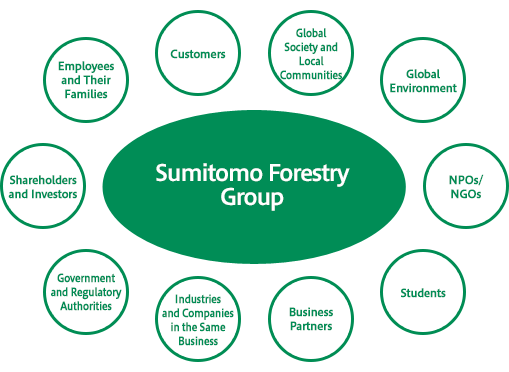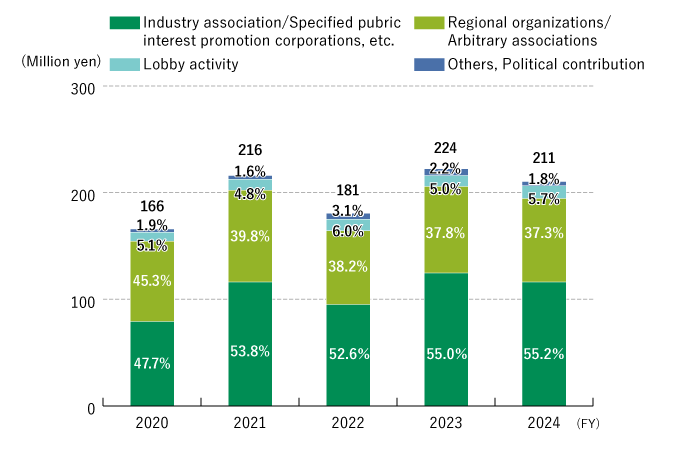- Home
- Sustainability
- Sumitomo Forestry Group's Sustainability Management
- Stakeholder Engagement
Stakeholder Engagement
Basic Policy
The Sumitomo Forestry Group is involved with various stakeholders because the business activities conducted by the Group are in a broad range of global businesses from the upstream to the downstream with wood—as a renewable natural resource—at the core. Our focus is always on communication as well as taking into account the direct and indirect relationships between stakeholders while we are engaged with our business activities, and sincerely responding to their expectations and requirements.
Stakeholders of the Sumitomo Forestry Group

Responsibilities and Communication Methods
Customers
Customer needs are diversifying as the social environment changes dramatically due to energy issues resulting from frequent large-scale disasters and global warming in addition to the decreasing population and aging society of Japan, depopulation and centralization to urban areas as well as a growing mindset toward health.
The Sumitomo Forestry Group conducts comprehensive efforts toward safety and quality issues based on these circumstances to not only reduce risk but also to create new business opportunities by responding to societal and environmental changes with the hope that it will further heighten customer satisfaction.
| Responsibilities | Communication Methods |
|---|---|
|
|
- Click here for related information
Employees and Their Families
A wide range of themes have been raised concerning social challenges related to employment and labor from human rights and the form of an equal workplace without discrimination to ensuring safety on-site, considerations toward work-life balance and the reduction of long working hours.
We believe that working to resolve these challenges is the driving force to improving corporate value and business promotion with positive effects including gaining human resources, improving the motivation of employees, and eliminating risks for employees.
| Responsibilities | Communication Methods |
|---|---|
|
|
- Click here for related information
Shareholders and Investors
In recent years, long-term institutional investors have shifted the way to evaluate a company. One emphasis from this perspective of evaluation is engagement. The dialogue between companies and their shareholders as well as investors is growing in terms of strategies and efforts to improve corporate value. Trends to promote even broader engagement are growing after the publishing of the Stewardship Code in Japan as well.
The Sumitomo Forestry Group places great importance on engagement from the perspectives of properly assessing the corporate value and earning trust from the market. The Group discloses a wide range of information, including non-financial information, in a timely and transparent manner to facilitate understanding among stakeholders of our management policies and business strategies, while regularly feeds back the opinions and requirements of investors who are a vital stakeholder into operations to put in place measures toward sustainable growth.
| Responsibilities | Communication Methods |
|---|---|
|
|
- Click here for related information
Government and Regulatory Authorities
As a company involved in a variety of businesses centered upon wood, the Sumitomo Forestry Group needs to adhere to laws and regulations by continually updating information about relevant laws and regulations in each region and country where it engages in business activities.
For example, in the field of housing construction, we must comply with the Building Standards Act as well as a wide range of other laws and regulations. In addition, in terms of forest management, we need to submit various notifications to the government and regulatory authorities because they are projects related to national land.
We strive to earn greater trust from society by thoroughly complying with the various laws and regulations as well as ensuring proper communication with the government and regulatory authorities in each country where our businesses are expanding.
| Responsibilities | Communication Methods |
|---|---|
|
|
Industries and Companies in the Same Business
The Sumitomo Forestry Group believes a fair, open competitive environment is essential to foster sustainable growth throughout the entire industry of its business.
We also know industry associations and other organizations are indispensable in creating relevant rules. We participate in organizations such as industry associations and contribute to the growth and development of the industry by taking a leading role as a front runner in the industry.
| Responsibilities | Communication Methods |
|---|---|
|
|
Business Partners
Promoting sustainable forest management and procuring wood from sustainable forests are extremely vital endeavors for the Sumitomo Forestry Group, which is expanding its business around "wood". We believe initiatives are also necessary to respond to risk elements that include the laws in each country and the various regulations related to the illegal logging.
These efforts strengthen our foundation of business by promoting the preservation, development, and forestation as well as effectively using limited global resources such as the active use of timber cut from forests that have received Forest Stewardship Council certification together with our business partners.
| Responsibilities | Communication Methods |
|---|---|
|
|
- Click here for related information
Students
The Sumitomo Forestry Group provides information on its philosophy, business models that contribute to the economy, society, and the environment through its core business, various initiatives such as workstyle reform, and its medium- to long-term vision to students who are entrusted with the next generation.
In addition to deepening understanding of Sumitomo Forestry, we are actively engaging in two-way communication using online tools in a rapidly changing environment.
| Responsibilities | Communication Methods |
|---|---|
|
|
- Click here for related information
NPOs/NGOs
The Sumitomo Forestry Group works with NPOs and NGOs that have specialized knowledge and understand the situation in the regions where they operate to address social issues such as deforestation, loss of biodiversity, and human rights issues. Through the cooperation with civil society, we fulfill our role for not only the company but also many other people. We expect to produce even greater results toward solving the challenges faced by society rooted in each community.
| Responsibilities | Communication Methods |
|---|---|
|
|
- Click here for related information
Global Environment
The Sumitomo Forestry Group prioritized the global environment in both the direct and indirect impact its business activities have on the world. The Group established its Environmental Philosophy in December 1994 and Group-wide Environmental Policies in October 2000.
We also formulated the Mid-Term Environmental Management Plan (FY2010-FY2014) with Mid-term environmental targets for the first time in fiscal 2009 and established the Mid-Term CSR Management Plan (FY2015-FY2020) that includes environmental targets in fiscal 2014. Furthermore, we are expanding the numerical targets of these plans and continuously enhancing the level of our environmentally conscious activities by implementing the PDCA cycle in each organization, for the Sustainability Targets as part of Sumitomo Forestry Group Mid-Term Management Plan in fiscal 2024.
| Responsibilities | Communication Methods |
|---|---|
|
|
Global Society and Local Communities
The Sumitomo Forestry Group recognizes the importance of contributing to the growth of local communities as well as protecting the local forest resources when starting and expanding businesses.
Therefore, we work to build an infrastructure for smooth operations and business expansion in each country and region by engaging in local social contribution activities and activities that focus on efforts, such as dialogue and cooperation with the local community in the promotion of overseas businesses.
| Responsibilities | Communication Methods |
|---|---|
|
|
- Click here for related information
Grievance Desk
The Sumitomo Forestry Group provides a Customer Service Department as a point of contact to handle inquiries from customers and local residents near ongoing housing construction, as well as a Compliance Hotline, an external consultation service through the Employee Assistance Program (EAP), and Harassment Help Desk for business partners and employees in addition to receiving inquiries such as complaints (in Japanese, English, and Chinese) at our website. We respond appropriately to inquiries received through our website by having the Corporate Communications Department receive them, then forward them according to their content to each relevant specialized department at the head office or each division handling the relevant operations.
In October 2019, we put in place a whistleblowing mechanism shared with Group companies overseas. An external multilingual operator is used for this reporting system to receive reports in English, Chinese, Indonesian, Vietnamese, and Thai.
Grievance Desks at overseas forestry companies
In many countries and regions, the land rights of indigenous peoples and local communities are recognized by formal and common law. While forestry projects have the potential to bring jobs and social development to a community, building and maintaining good relationships through communication with these stakeholders is also crucial for the protection of human rights and the sustainability of our businesses.
Indonesia
We implemented and have been operating a grievance mechanism at our forest operations in Indonesia since 2018. We receive comments and requests from residents of local communities, through regular visits or in writing, and respond to them within seven working days as a general rule. In 2024, PT. Wana Subur Lestari (WSL) and PT. Mayangkara Tanaman Industri (MTI) received 19 comments and requests in total and all were already responded.
Papua New Guinea
At Open Bay Timber Ltd. (OBT) in Papua New Guinea has put in place a complaint box in which anyone from the area within and outside the company operation can post a complaint, request or comment. Inquiries received in this way from local residents and others in the area are shared internally as needed so that we can undertake appropriate responses. We have received requests regarding benefits and respond appropriately after carefully examining the details.
New Zealand
Tasman Pine Forests Ltd. (TPF) in New Zealand registers any important exchanges with local residents, partner companies and other stakeholders in a stakeholder registry. This includes meetings with regional environmental groups and consultations with local residents regarding things like operational plans. Communication with a recognition of the past background helps to build smooth relationships.
- Click here for related information
Contributions to Public Policy
The Sumitomo Forestry Group coordinates and cooperates with national and local governments, the business community and others, making recommendations toward the improvement and resolution of worsening environmental and social issues.
Public Service (As of December 31, 2024)
| Organization | Position |
|---|---|
| Council for the Promotion of Decentralization Reform, Cabinet Office | Chairperson |
| Japan Association of Corporate Executives | Secretary |
| Organization for Landscape and Urban Green Infrastructure | Chairperson (Representative Director) |
| Keidanren (Japan Business Federation) | Standing Secretary |
| Keidanren Nature Conservation Council | Vice-chairperson |
| Japan Federation of Housing Organizations | Vice-chairperson (Representative Director) |
| Wooden Home Builders Association of Japan | Chairperson (Representative Director) |
| The Machinami Foundation | Director |
| Japan International Association for the Industry of Urban Development, Building and Housing | Chairperson (Representative Director) |
| The Provision of Quality Housing Stock Association | Vice-chairperson |
| Japan Wood Design Association | Vice-chairperson & Representative Director |
| Japan-China Association for Building and Housing Industry | Vice-chairperson (Director) |
Costs Such as to Various Associations*1

*1The aggregation period of fiscal 2020 is from April to December 2020
- Home
- Sustainability
- Sumitomo Forestry Group's Sustainability Management
- Stakeholder Engagement

